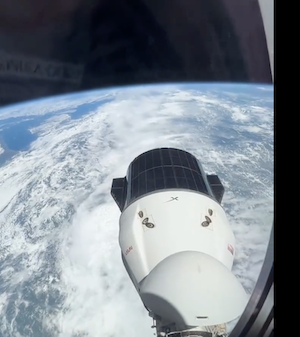The Overlooked Triumphs of SpaceX and Dragon
In an age where headlines are often dominated by terrestrial controversies and political narratives, the groundbreaking achievements of SpaceX and its Dragon spacecraft seem to hover just out of the mainstream media’s spotlight. Here’s why this might be one of the most under-discussed stories of our time, potentially influenced by a bias against Elon Musk and his ventures.
SpaceX’s Polaris Dawn shattered records—the first commercial spacewalk, humans traveling the farthest in 50 years, and a historic achievement for women in space – the farthest any woman has ever been from mother earth. Yet Biden and Harris remain silent. No shock—this… pic.twitter.com/urMB41NlqT
— @amuse (@amuse) September 13, 2024
The Feats of SpaceX and Dragon:
- Commercial Spacewalks: SpaceX has achieved what was once the exclusive domain of government space agencies by conducting the first-ever commercial spacewalk. This wasn’t just a symbolic step; it was a monumental leap towards making space more accessible, potentially paving the way for space tourism or even colonization.
- Engineering Marvels: The Dragon spacecraft has not only delivered over 300,000 lbs of cargo to the ISS but has done so with an efficiency that’s setting new standards in space logistics. Its precision in maneuvers, like reaching an apogee of 1,400.7 km, showcases engineering prowess that should be celebrated as national achievements.
- Safety and Reliability: With over 45 launches and safely transporting 50 crew members, including 46 to the ISS, SpaceX’s Dragon has demonstrated an unparalleled commitment to safety and reliability. Each mission, each return, underscores a triumph over the inherent risks of space travel.
Polaris Dawn and Dragon at 1,400 km above Earth – the farthest humans have traveled since the Apollo program over 50 years ago pic.twitter.com/rRDeD1dY1e
— SpaceX (@SpaceX) September 11, 2024
Why Isn’t This News? The Bias Angle:
- Media Bias Against Musk: There’s an observable bias in media coverage towards Elon Musk, often painting his endeavors in a negative light or downplaying their significance. This might reflect broader societal or political sentiments against Musk, who has become a polarizing figure due to his outspoken nature and business practices.
- Complexity and Accessibility: Space achievements are complex, filled with technical details that might not captivate a general audience as readily as political scandals or celebrity gossip. However, this complexity could also be used as an excuse to sideline these stories, especially if there’s an underlying bias against the figurehead of these achievements.
- The Novelty Wears Off: Initially, every SpaceX launch was news. Now, with increasing frequency and success, there might be an assumption that these missions are routine, overlooking the incremental innovations and the cumulative impact on space technology. This shift could be exacerbated by a bias against acknowledging Musk’s successes.
- Economic and Political Narratives: There’s a narrative around space exploration that it’s an expenditure rather than an investment. This perspective might be fueled by economic discussions where space programs are pitted against social spending, overshadowing the long-term benefits of space technology. However, this narrative could also be a convenient cover for a bias against Musk’s vision.
The Importance of Acknowledging These Triumphs:
SpaceX’s achievements with Dragon are not just about reaching new heights or circling the Earth; they’re about redefining what’s possible. These missions are laying the groundwork for future technologies, potentially solving Earth’s overpopulation, resource depletion, and even existential threats like asteroid impacts.
The lack of widespread discussion might also be a missed opportunity for inspiration. Celebrating these triumphs could encourage more young minds towards STEM fields, foster international collaboration, and remind us of humanity’s boundless potential. However, if there’s a bias against Musk, these stories might be deliberately or subconsciously downplayed.
Star Wars
Star Wars music recorded in space by Polaris Dawn crewmember and violinist @Gillis_SarahE and sent to Earth. Incredible music and an incredible video
— Star Wars Holocron (@sw_holocron) September 15, 2024
pic.twitter.com/uXHxozcw8D
The triumph of SpaceX and Dragon isn’t just a story of technological advancement; it’s a narrative of human ambition, innovation, and the relentless pursuit of the unknown. Perhaps, it’s time for media outlets and the public to look up, not just for the stars, but for the stories of human achievement that are unfolding above us, often in silence. Why aren’t we talking about this? Maybe because of a bias against the man leading the charge, or perhaps, we’re too busy looking down to notice the sky. Let’s change that narrative, for in space, every step is a giant leap for mankind.
Commander @rookisaacman has egressed Dragon and is going through the first of three suit mobility tests that will test overall hand body control, vertical movement with Skywalker, and foot restraint pic.twitter.com/XATJQhLuIZ
— SpaceX (@SpaceX) September 12, 2024
View of SpaceX Dragon from another Dragon 🐉🐉 pic.twitter.com/fSA7Ssas5x
— Dima Zeniuk (@DimaZeniuk) September 11, 2024
